- Home
- Henry James
The Golden Bowl - Complete Page 2
The Golden Bowl - Complete Read online
Page 2
"Oh," she had returned, "you shall not be buried, my dear, till you're dead. Unless indeed you call it burial to go to American City."
"Before I pronounce I should like to see my tomb." So he had had, after his fashion, the last word in their interchange, save for the result of an observation that had risen to his lips at the beginning, which he had then checked, and which now came back to him. "Good, bad or indifferent, I hope there's one thing you believe about me."
He had sounded solemn, even to himself, but she had taken it gaily. "Ah, don't fix me down to 'one'! I believe things enough about you, my dear, to have a few left if most of them, even, go to smash. I've taken care of THAT. I've divided my faith into water-tight compartments. We must manage not to sink."
"You do believe I'm not a hypocrite? You recognise that I don't lie or dissemble or deceive? Is THAT water-tight?"
The question, to which he had given a certain intensity, had made her, he remembered, stare an instant, her colour rising as if it had sounded to her still stranger than he had intended. He had perceived on the spot that any SERIOUS discussion of veracity, of loyalty, or rather of the want of them, practically took her unprepared, as if it were quite new to her. He had noticed it before: it was the English, the American sign that duplicity, like "love," had to be joked about. It couldn't be "gone into." So the note of his inquiry was—well, to call it nothing else— premature; a mistake worth making, however, for the almost overdone drollery in which her answer instinctively sought refuge.
"Water-tight—the biggest compartment of all? Why, it's the best cabin and the main deck and the engine-room and the steward's pantry! It's the ship itself—it's the whole line. It's the captain's table and all one's luggage—one's reading for the trip." She had images, like that, that were drawn from steamers and trains, from a familiarity with "lines," a command of "own" cars, from an experience of continents and seas, that he was unable as yet to emulate; from vast modern machineries and facilities whose acquaintance he had still to make, but as to which it was part of the interest of his situation as it stood that he could, quite without wincing, feel his future likely to bristle with them.
It was in fact, content as he was with his engagement and charming as he thought his affianced bride, his view of THAT furniture that mainly constituted our young man's "romance"—and to an extent that made of his inward state a contrast that he was intelligent enough to feel. He was intelligent enough to feel quite humble, to wish not to be in the least hard or voracious, not to insist on his own side of the bargain, to warn himself in short against arrogance and greed. Odd enough, of a truth, was his sense of this last danger—which may illustrate moreover his general attitude toward dangers from within. Personally, he considered, he hadn't the vices in question—and that was so much to the good. His race, on the other hand, had had them handsomely enough, and he was somehow full of his race. Its presence in him was like the consciousness of some inexpugnable scent in which his clothes, his whole person, his hands and the hair of his head, might have been steeped as in some chemical bath: the effect was nowhere in particular, yet he constantly felt himself at the mercy of the cause. He knew his antenatal history, knew it in every detail, and it was a thing to keep causes well before him. What was his frank judgment of so much of its ugliness, he asked himself, but a part of the cultivation of humility? What was this so important step he had just taken but the desire for some new history that should, so far as possible, contradict, and even if need be flatly dishonour, the old? If what had come to him wouldn't do he must MAKE something different. He perfectly recognised—always in his humility—that the material for the making had to be Mr. Verver's millions. There was nothing else for him on earth to make it with; he had tried before—had had to look about and see the truth. Humble as he was, at the same time, he was not so humble as if he had known himself frivolous or stupid. He had an idea—which may amuse his historian—that when you were stupid enough to be mistaken about such a matter you did know it. Therefore he wasn't mistaken—his future might be MIGHT be scientific. There was nothing in himself, at all events, to prevent it. He was allying himself to science, for what was science but the absence of prejudice backed by the presence of money? His life would be full of machinery, which was the antidote to superstition, which was in its turn, too much, the consequence, or at least the exhalation, of archives. He thought of these—of his not being at all events futile, and of his absolute acceptance of the developments of the coming age to redress the balance of his being so differently considered. The moments when he most winced were those at which he found himself believing that, really, futility would have been forgiven him. Even WITH it, in that absurd view, he would have been good enough. Such was the laxity, in the Ververs, of the romantic spirit. They didn't, indeed, poor dears, know what, in that line—the line of futility—the real thing meant. HE did— having seen it, having tried it, having taken its measure. This was a memory in fact simply to screen out—much as, just in front of him while he walked, the iron shutter of a shop, closing early to the stale summer day, rattled down at the turn of some crank. There was machinery again, just as the plate glass, all about him, was money, was power, the power of the rich peoples. Well, he was OF them now, of the rich peoples; he was on their side—if it wasn't rather the pleasanter way of putting it that they were on his.
Something of this sort was in any case the moral and the murmur of his walk. It would have been ridiculous—such a moral from such a source—if it hadn't all somehow fitted to the gravity of the hour, that gravity the oppression of which I began by recording. Another feature was the immediate nearness of the arrival of the contingent from home. He was to meet them at Charing Cross on the morrow: his younger brother, who had married before him, but whose wife, of Hebrew race, with a portion that had gilded the pill, was not in a condition to travel; his sister and her husband, the most anglicised of Milanesi, his maternal uncle, the most shelved of diplomatists, and his Roman cousin, Don Ottavio, the most disponible of ex-deputies and of relatives—a scant handful of the consanguineous who, in spite of Maggie's plea for hymeneal reserve, were to accompany him to the altar. It was no great array, yet it was apparently to be a more numerous muster than any possible to the bride herself, having no wealth of kinship to choose from and making it up, on the other hand, by loose invitations. He had been interested in the girl's attitude on the matter and had wholly deferred to it, giving him, as it did, a glimpse, distinctly pleasing, of the kind of ruminations she would in general be governed by—which were quite such as fell in with his own taste. They hadn't natural relations, she and her father, she had explained; so they wouldn't try to supply the place by artificial, by make-believe ones, by any searching of highways and hedges. Oh yes, they had acquaintances enough—but a marriage was an intimate thing. You asked acquaintances when you HAD your kith and kin—you asked them over and above. But you didn't ask them alone, to cover your nudity and look like what they weren't. She knew what she meant and what she liked, and he was all ready to take from her, finding a good omen in both of the facts. He expected her, desired her, to have character; his wife SHOULD have it, and he wasn't afraid of her having much. He had had, in his earlier time, to deal with plenty of people who had had it; notably with the three four ecclesiastics, his great-uncle, the Cardinal, above all, who had taken a hand and played a part in his education: the effect of all of which had never been to upset him. He was thus fairly on the look-out for the characteristic in this most intimate, as she was to come, of his associates. He encouraged it when it appeared.
He felt therefore, just at present, as if his papers were in order, as if his accounts so balanced as they had never done in his life before and he might close the portfolio with a snap. It would open again, doubtless, of itself, with the arrival of the Romans; it would even perhaps open with his dining to-night in Portland Place, where Mr. Verver had pitched a tent suggesting that of Alexander furnished with the spoils of Darius. But what meanwhile marked his crisis, as I h
ave said, was his sense of the immediate two or three hours. He paused on corners, at crossings; there kept rising for him, in waves, that consciousness, sharp as to its source while vague as to its end, which I began by speaking of—the consciousness of an appeal to do something or other, before it was too late, for himself. By any friend to whom he might have mentioned it the appeal could have been turned to frank derision. For what, for whom indeed but himself and the high advantages attached, was he about to marry an extraordinarily charming girl, whose "prospects," of the solid sort, were as guaranteed as her amiability? He wasn't to do it, assuredly, all for her. The Prince, as happened, however, was so free to feel and yet not to formulate that there rose before him after a little, definitely, the image of a friend whom he had often found ironic. He withheld the tribute of attention from passing faces only to let his impulse accumulate. Youth and beauty made him scarcely turn, but the image of Mrs. Assingham made him presently stop a hansom. HER youth, her beauty were things more or less of the past, but to find her at home, as he possibly might, would be "doing" what he still had time for, would put something of a reason into his restlessness and thereby probably soothe it. To recognise the propriety of this particular pilgrimage—she lived far enough off, in long Cadogan Place—was already in fact to work it off a little. A perception of the propriety of formally thanking her, and of timing the act just as he happened to be doing—this, he made out as he went, was obviously all that had been the matter with him. It was true that he had mistaken the mood of the moment, misread it rather, superficially, as an impulse to look the other way—the other way from where his pledges had accumulated. Mrs. Assingham, precisely, represented, embodied his pledges—was, in her pleasant person, the force that had set them successively in motion. She had MADE his marriage, quite as truly as his papal ancestor had made his family—though he could scarce see what she had made it for unless because she too was perversely romantic. He had neither bribed nor persuaded her, had given her nothing—scarce even till now articulate thanks; so that her profit-to think of it vulgarly—must have all had to come from the Ververs.
Yet he was far, he could still remind himself, from supposing that she had been grossly remunerated. He was wholly sure she hadn't; for if there were people who took presents and people who didn't she would be quite on the right side and of the proud class. Only then, on the other hand, her disinterestedness was rather awful—it implied, that is, such abysses of confidence. She was admirably attached to Maggie—whose possession of such a friend might moreover quite rank as one of her "assets"; but the great proof of her affection had been in bringing them, with her design, together. Meeting him during a winter in Rome, meeting him afterwards in Paris, and "liking" him, as she had in time frankly let him know from the first, she had marked him for her young friend's own and had then, unmistakably, presented him in a light. But the interest in Maggie—that was the point—would have achieved but little without her interest in HIM. On what did that sentiment, unsolicited and unrecompensed, rest? what good, again—for it was much like his question about Mr. Verver—should he ever have done her? The Prince's notion of a recompense to women—similar in this to his notion of an appeal—was more or less to make love to them. Now he hadn't, as he believed, made love the least little bit to Mrs. Assingham—nor did he think she had for a moment supposed it. He liked in these days, to mark them off, the women to whom he hadn't made love: it represented— and that was what pleased him in it—a different stage of existence from the time at which he liked to mark off the women to whom he had. Neither, with all this, had Mrs. Assingham herself been either aggressive or resentful. On what occasion, ever, had she appeared to find him wanting? These things, the motives of such people, were obscure—a little alarmingly so; they contributed to that element of the impenetrable which alone slightly qualified his sense of his good fortune. He remembered to have read, as a boy, a wonderful tale by Allan Poe, his prospective wife's countryman-which was a thing to show, by the way, what imagination Americans COULD have: the story of the shipwrecked Gordon Pym, who, drifting in a small boat further toward the North Pole—or was it the South?—than anyone had ever done, found at a given moment before him a thickness of white air that was like a dazzling curtain of light, concealing as darkness conceals, yet of the colour of milk or of snow. There were moments when he felt his own boat move upon some such mystery. The state of mind of his new friends, including Mrs. Assingham herself, had resemblances to a great white curtain. He had never known curtains but as purple even to blackness—but as producing where they hung a darkness intended and ominous. When they were so disposed as to shelter surprises the surprises were apt to be shocks.
Shocks, however, from these quite different depths, were not what he saw reason to apprehend; what he rather seemed to himself not yet to have measured was something that, seeking a name for it, he would have called the quantity of confidence reposed in him. He had stood still, at many a moment of the previous month, with the thought, freshly determined or renewed, of the general expectation—to define it roughly—of which he was the subject. What was singular was that it seemed not so much an expectation of anything in particular as a large, bland, blank assumption of merits almost beyond notation, of essential quality and value. It was as if he had been some old embossed coin, of a purity of gold no longer used, stamped with glorious arms, mediaeval, wonderful, of which the "worth" in mere modern change, sovereigns and half crowns, would be great enough, but as to which, since there were finer ways of using it, such taking to pieces was superfluous. That was the image for the security in which it was open to him to rest; he was to constitute a possession, yet was to escape being reduced to his component parts. What would this mean but that, practically, he was never to be tried or tested? What would it mean but that, if they didn't "change" him, they really wouldn't know—he wouldn't know himself—how many pounds, shillings and pence he had to give? These at any rate, for the present, were unanswerable questions; all that was before him was that he was invested with attributes. He was taken seriously. Lost there in the white mist was the seriousness in them that made them so take him. It was even in Mrs. Assingham, in spite of her having, as she had frequently shown, a more mocking spirit. All he could say as yet was that he had done nothing, so far as to break any charm. What should he do if he were to ask her frankly this afternoon what was, morally speaking, behind their veil. It would come to asking what they expected him to do. She would answer him probably: "Oh, you know, it's what we expect you to be!" on which he would have no resource but to deny his knowledge. Would that break the spell, his saying he had no idea? What idea in fact could he have? He also took himself seriously—made a point of it; but it wasn't simply a question of fancy and pretension. His own estimate he saw ways, at one time and another, of dealing with: but theirs, sooner or later, say what they might, would put him to the practical proof. As the practical proof, accordingly, would naturally be proportionate to the cluster of his attributes, one arrived at a scale that he was not, honestly, the man to calculate. Who but a billionaire could say what was fair exchange for a billion? That measure was the shrouded object, but he felt really, as his cab stopped in Cadogan Place, a little nearer the shroud. He promised himself, virtually, to give the latter a twitch.
II
"They're not good days, you know," he had said to Fanny Assingham after declaring himself grateful for finding her, and then, with his cup of tea, putting her in possession of the latest news—the documents signed an hour ago, de part et d'autre, and the telegram from his backers, who had reached Paris the morning before, and who, pausing there a little, poor dears, seemed to think the whole thing a tremendous lark. "We're very simple folk, mere country cousins compared with you," he had also observed, "and Paris, for my sister and her husband, is the end of the world. London therefore will be more or less another planet. It has always been, as with so many of us, quite their Mecca, but this is their first real caravan; they've mainly known 'old England' as a shop for articl
es in india-rubber and leather, in which they've dressed themselves as much as possible. Which all means, however, that you'll see them, all of them, wreathed in smiles. We must be very easy with them. Maggie's too wonderful—her preparations are on a scale! She insists on taking in the sposi and my uncle. The others will come to me. I've been engaging their rooms at the hotel, and, with all those solemn signatures of an hour ago, that brings the case home to me."
"Do you mean you're afraid?" his hostess had amusedly asked.
"Terribly afraid. I've now but to wait to see the monster come. They're not good days; they're neither one thing nor the other. I've really got nothing, yet I've everything to lose. One doesn't know what still may happen."
The way she laughed at him was for an instant almost irritating; it came out, for his fancy, from behind the white curtain. It was a sign, that is, of her deep serenity, which worried instead of soothing him. And to be soothed, after all, to be tided over, in his mystic impatience, to be told what he could understand and believe—that was what he had come for. "Marriage then," said Mrs. Assingham, "is what you call the monster? I admit it's a fearful thing at the best; but, for heaven's sake, if that's what you're thinking of, don't run away from it."
"Ah, to run away from it would be to run away from you," the Prince replied; "and I've already told you often enough how I depend on you to see me through." He so liked the way she took this, from the corner of her sofa, that he gave his sincerity—for it WAS sincerity—fuller expression. "I'm starting on the great voyage—across the unknown sea; my ship's all rigged and appointed, the cargo's stowed away and the company complete. But what seems the matter with me is that I can't sail alone; my ship must be one of a pair, must have, in the waste of waters, a—what do you call it?—a consort. I don't ask you to stay on board with me, but I must keep your sail in sight for orientation. I don't in the least myself know, I assure you, the points of the compass. But with a lead I can perfectly follow. You MUST be my lead."

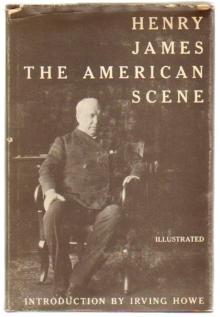 The American
The American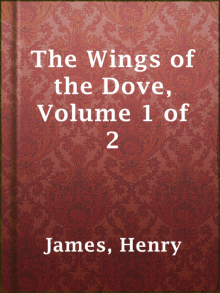 The Wings of the Dove, Volume 1 of 2
The Wings of the Dove, Volume 1 of 2 Frost at Midnight
Frost at Midnight Morning Frost
Morning Frost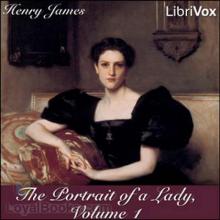 The Portrait of a Lady — Volume 1
The Portrait of a Lady — Volume 1 Fatal Frost
Fatal Frost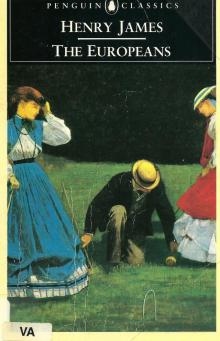 The Europeans
The Europeans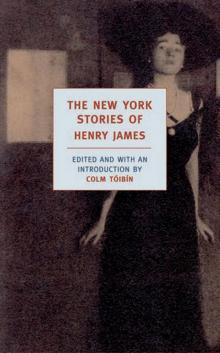 The New York Stories of Henry James
The New York Stories of Henry James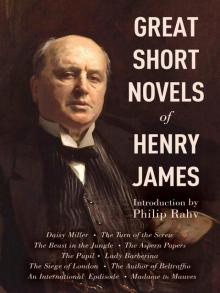 Great Short Novels of Henry James
Great Short Novels of Henry James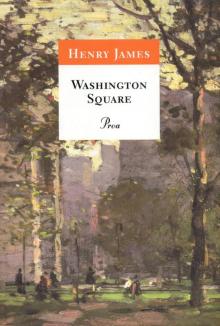 Washington Square
Washington Square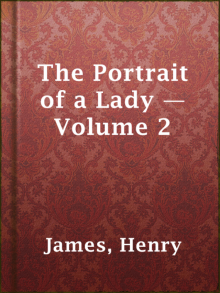 The Portrait of a Lady — Volume 2
The Portrait of a Lady — Volume 2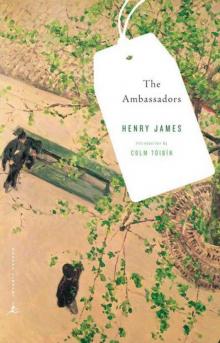 The Ambassadors
The Ambassadors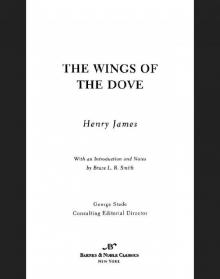 The Wings of the Dove
The Wings of the Dove The Princess Casamassima (Classics)
The Princess Casamassima (Classics)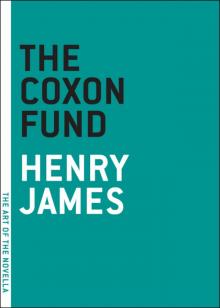 The Coxon Fund
The Coxon Fund First Frost
First Frost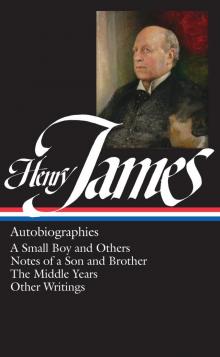 Henry James
Henry James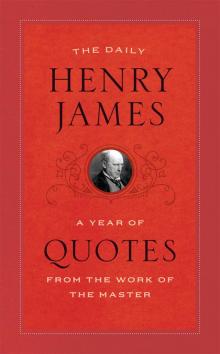 The Daily Henry James
The Daily Henry James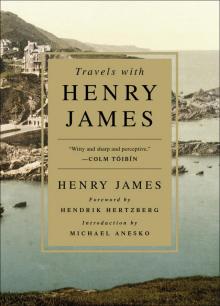 Travels With Henry James
Travels With Henry James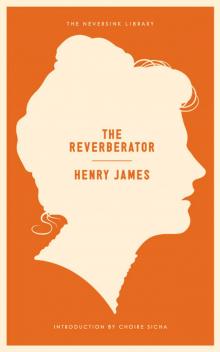 The Reverberator: A Novel
The Reverberator: A Novel What Maisie Knew (Henry James Collection)
What Maisie Knew (Henry James Collection)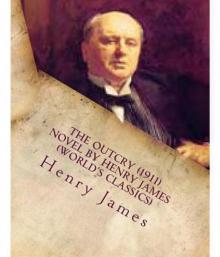 The Outcry
The Outcry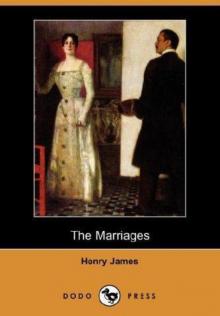 The Marriages
The Marriages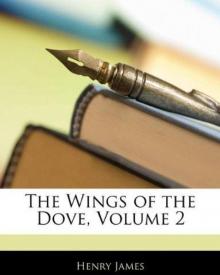 The Wings of the Dove, Volume 2
The Wings of the Dove, Volume 2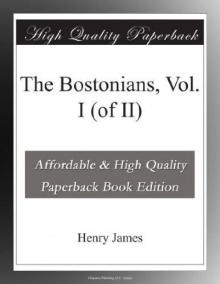 The Bostonians, Vol. I
The Bostonians, Vol. I The Outcry: -1911
The Outcry: -1911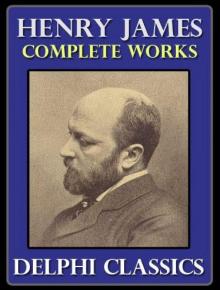 The Complete Works of Henry James
The Complete Works of Henry James Letters from the Palazzo Barbaro
Letters from the Palazzo Barbaro The Pupil
The Pupil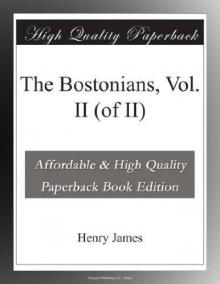 The Bostonians, Vol. II
The Bostonians, Vol. II Pandora
Pandora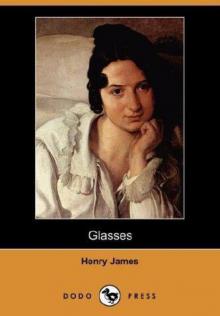 Glasses
Glasses The Princess Casamassima
The Princess Casamassima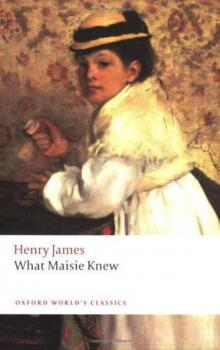 What Maisie Knew
What Maisie Knew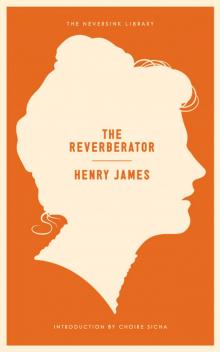 The Reverberator
The Reverberator The Golden Bowl - Complete
The Golden Bowl - Complete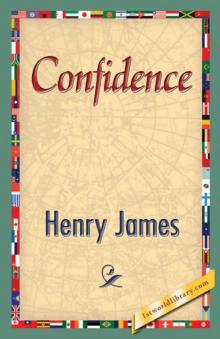 Confidence
Confidence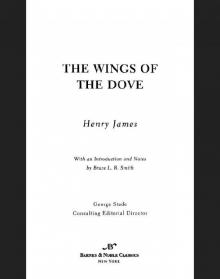 Wings of the Dove (Barnes & Noble Classics Series)
Wings of the Dove (Barnes & Noble Classics Series) The Spoils of Poynton
The Spoils of Poynton